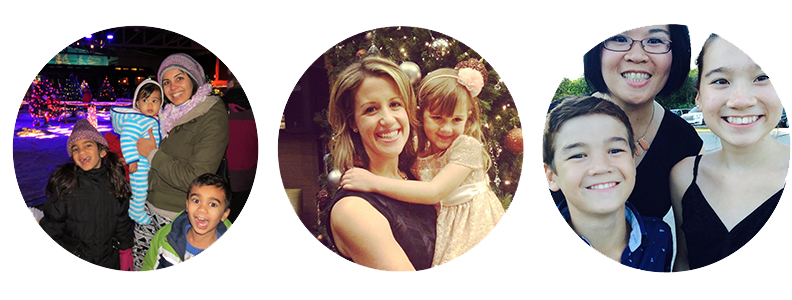Moms Share Tips on Teaching Kids to be Charitable
December 18, 2014
6 min read
Christmas can be a magical time — for kids and adults alike. But for kids especially, there’s nothing more exciting than planning a wish list, asking Santa for presents, and listening for reindeer on Christmas Eve.
But with its emphasis on getting presents, the focus on consumerism during the holidays can make it tough for parents who want to instill charitable values. How do you teach your kids the joy of giving selflessly to others when society places so much emphasis on getting? How do you achieve a balance between the two?
As I pondered how to position ‘giving’ alongside ‘getting’ with my family this Christmas, I came across a post from a friend that told the story of her son, who had decided to give his Christmas money to children who were less fortunate.
I asked that friend along with two other charitable moms for some tips on how to talk to kids about charity, and how to integrate it into family life. Here’s the advice they shared.
[tw-column width=”one-third”]
Taslim Jaffer is mom to three kids aged 1, 4 and 7. She is also a freelance writer, public speaker and blogs at Let ME Out!!
[/tw-column]
[tw-column width=”one-third”]
Jen Schaeffers is mom to two kids aged 2½ and 5½. She is also the executive director of the CKNW Orphans Fund.
[/tw-column]
[tw-column width=”one-third” position=”last”]
Kah-Mei Cheah-Smith is mom to two kids aged 11 and 13. She is also a distributor for Young Living Essential Oils.
[/tw-column]
Q: How did you introduce the concept of charitable giving to your kids?
Taslim: The first formal charitable giving project we did in our home was when our oldest was just under 3 years old, and our son was just born. My mom used to collect pennies in this big glass bottle and after she passed away, we continued to fill it. My daughter helped us roll the pennies and we wrote out a cheque for Pennies for Peace – an initiative to fund girls’ schools in Central Asia. She received a certificate thanking her for her help, which we framed and put up in her room – it’s still there 4 years later!
Jen: I’m just starting on this and trying it out this Christmas. I try to simplify the concept of charity as much as possible. Now that my daughter is in kindergarten, she gets it. We have spoken about how other kids won’t get toys. We frame it as “Santa doesn’t bring them as much” and tell her that she gets gifts from Mommy and Daddy too, which other kids don’t get.
Kah-Mei: We’ve always tried to teach the kids to be grateful for everything they have. On the news and on TV, they see kids who are starving in third-world countries; they see children having to walk miles to fetch water, or not being able to attend school. So we encourage gratitude for the basic things we have because there are so many children in the world who do not have those basics. We have also sponsored a child from World Vision for almost 20 years.
“We’ve decided to do away with too many frivolous toys and put the money toward a children’s home in Uganda.” — Kah-Mei Cheah-Smith
Q: Is there an approach that makes understanding charity easier for kids?
Taslim: I think that even when the abstract understanding isn’t there, it’s important to model these values so when your child is old enough to understand, it’s not a big shock to their lifestyle. If they have grown up always putting aside some of their allowance for charity, or choosing items in a grocery store to donate to the food bank, they will think nothing of it at any age. The younger you start, the more it becomes just a part of who they are.
Jen: There are many different ways to expose children to giving back. This year we’ll pick out a toy and drop it off at the Lower Mainland Christmas Bureau. We also try to focus on experiences in addition to gifts. We’ve gone to events for the food bank and I involve them in that when grocery shopping. As they get older I want them to get involved in volunteering.
Kah-Mei: It helps them to see that the money they were going to spend on a new iPod could help fund a child’s schooling for a year. They still want the iPod, but at least they are thinking of others. Even if they decide to give a portion of the money saved for a new iPod to charity, they have learned to put off getting something new for themselves, and think of others first. The older they get the easier it is for them to understand and to be more empathetic.
“Tap into your children’s interest and passions when selecting a charity to support. Sports, animals, whatever they like. Be creative and find a charity connected to that.” — Taslim Jaffer
Q: What tips would you give parents who would like to introduce charity this Christmas but aren’t sure how?
Taslim: Don’t make charity just a Christmas thing. Imagine how shocking it is when 11 months out of the 12 they aren’t expected to think outside their own world, and then during the month that highlights all the fun things they have come to equate with Christmas, they suddenly have to think of the people who don’t have what they do. Make charity a way of life and then giving at Christmas is just like any other time.
Jen: Charitable giving can’t just happen at Christmas. Choose a few times a year to get involved in charity, and then it will become ingrained. Talk about your family values and lead by example. Charity also benefits from social media awareness. If you have older kids who are involved in social media but can’t give just yet, they could help spread the word instead. If your child has charitable sensitivities, nurture and support them and help elevate them.
Kah-Mei: Don’t be afraid to expose your children to the reality of poverty or need. Travel often, especially to other countries so they see for themselves the difference between want and need. Talk about it all year long. We also teach our kids to tithe to our church and explain what it’s used for. At Christmas, little ones can start by putting money in the kettles. Even passing down toys and clothing is a small step toward learning how to help others.
“Teach gratitude and provide experiential opportunities. First-hand exposure that is age-appropriate is invaluable to explain the concept of charity.” — Jen Schaeffers
Want to give with your family this Christmas? Check out Give On, which brings together some of the charitable campaigns you can donate to on Chimp. Or, learn more about easy ways to integrate charity into everyday life.

